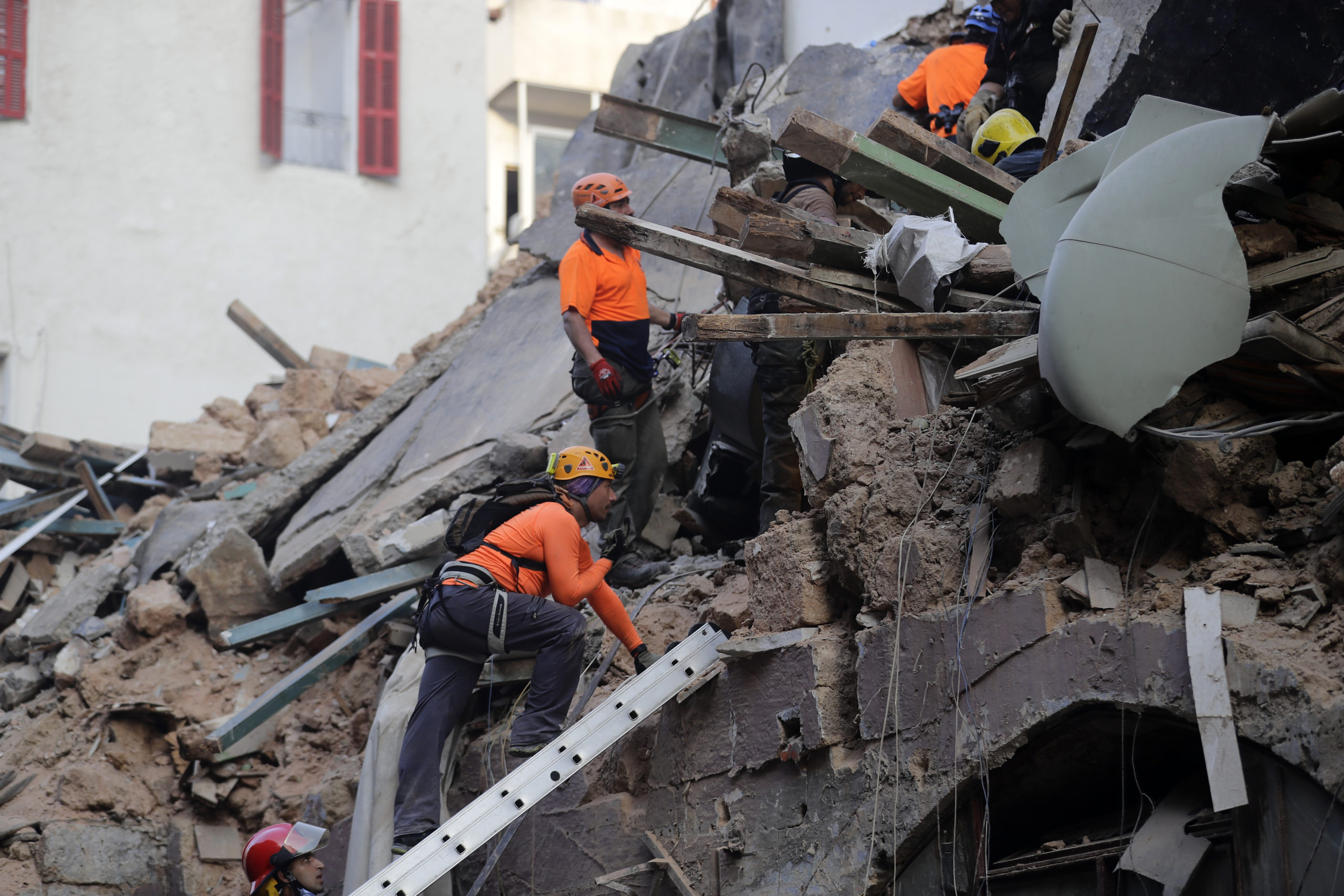Blast-hit Beirut begins timid recovery

Rescue workers dig through the rubble of a badly damaged building in Lebanon’s capital Beirut, in search of possible survivors from a mega-blast at the adjacent port one month ago, after scanners detected a pulse, on September 3, 2020. – A sniffer dog used by Chilean rescuers on last night responded to a scent from the site of a collapsed building in the Gemmayzeh area, the city’s governor told reporters at the scene. (Photo by JOSEPH EID / AFP)
BEIRUT, Lebanon — In a blast-damaged tailor shop in the Lebanese capital, Claudette is back at work sewing the hem of an orange skirt as rescue teams dig nearby.
“The explosion destroyed everything here, but I decided to return to work because I have no choice,” said the 60-year-old seamstress in the Gemmayzeh neighborhood.
The area was among the hardest hit by the deadly August 4 blast at nearby Beirut port that ravaged swathes of the capital and piled on new misery for Lebanese already reeling from the coronavirus pandemic and the country’s worst economic crisis in decades.
Rescue workers resumed a search for possible survivors under the rubble on Friday buoyed by faint hopes of a miracle after scanners detected a pulse.
A sniffer dog used by Chilean rescuers on Wednesday night responded to a scent from the site of a collapsed building in Gemmayzeh, the city’s governor Marwan Abboud told reporters at the scene.
One month on, seven people are still posted as missing. A total of 191 have been confirmed killed in Lebanon’s deadliest peacetime disaster.
In Gemmayzeh, life is trickling back as an army of volunteers sweep away debris and workmen carry out repairs.
Claudette is among a handful of store owners trying to pick up where they had left off.
“My husband is unemployed, and my 33-year-old son has been fired because of the economic crisis,” Lebanon’s worst since its 1975-1990 civil war, she said.
“He has two children and a rent to pay, I have to help him,” she said of her son, spools of colored thread neatly arranged on a shelf behind her.
‘Ghost town’
Like many neighbors’, Claudette’s storefront was shattered by the blast, while her expensive sewing machine was badly damaged.
Donations from a charity helped pay for a new glass storefront but the cost of repairing the machine came out of her own pocket.
The outlook for the future remains grim.
“Most of my clients used to live here. I’m afraid they’ll never come back,” she said, calling the area a “ghost town.”
In a nearby bakery, a man removed hot flat bread topped with thyme or cheese from a large oven, filling the air with scents.
After quick but extensive repairs, Hikmat Kaai reopened just days after the explosion.
“We’re trying to reconnect with life because we have hope,” Kaai said.
Gemmayzeh, a district known for heritage buildings, trendy bars and hip art galleries, still looks like a wasteland, even with tons of shattered glass and debris removed.
Many of its architectural gems have totally collapsed, while others have been scarred by gaping holes or left roof-less.
On the main street, the Iman Cafe was severely damaged in the explosion, with only its grill left intact.
Its owner, who carried out limited repairs, now serves only sandwiches because most of his kitchen equipment was destroyed.
“We survive thanks to the volunteers and to the NGO employees involved in reconstruction work who come to eat at our place,” said manager Mehsen.
‘Resisting’
Few people stroll the streets of adjacent Mar Mikhail, once the beating heart of Beirut’s nightlife.
In the shadow of gutted buildings, three young men sipped beers as they blasted music from a speaker sitting on a pavement littered with debris.
In the apocalyptic landscape, blighted by Beirut’s constant power cuts, one bar had lights on.
Inside, customers drank colorful cocktails. Parked outside were the skeletons of charred cars.
“It’s our way of resisting. We will continue to drink and celebrate life,” one of them said.
The nearby Cyrano bar, which had one of its waitresses killed in the blast, is determined to make a comeback.
“We didn’t reopen for the money, but to send a message of life,” said its owner, Elie Khoury, 37.
“We’ve known war, bombings, attacks, and we’ve always got back on our feet,” he said.